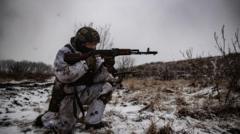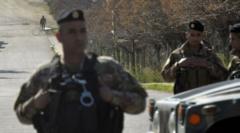The exchange, which is the latest in a series of handovers, highlights the complex dynamics of the ongoing Israeli-Palestinian conflict, emphasizing the roles of negotiation and public sentiment in peace talks.
Hamas Releases Three Israeli Hostages, Cease-Fire Extended

Hamas Releases Three Israeli Hostages, Cease-Fire Extended
Amid ongoing conflicts, Hamas has released three Israeli hostages, prolonging a fragile cease-fire with Israel as part of a prisoner exchange agreement.
The recent release of three Israeli hostages is a crucial episode in the ongoing conflict between Hamas and Israel, which has seen extensive violence since October 2023. On February 15, 2025, Hamas turned over hostages Sasha Troufanov, Iair Horn, and Sagui Dekel-Chen in exchange for the anticipated release of over 360 Palestinian prisoners, including individuals sentenced to life for attacks on Israelis. This hostage exchange marks the sixth series of releases aimed at justifying and prolonging a tenuous cease-fire that has shown signs of breaking down throughout the week.
The backdrop to this pivotal moment encompasses intense negotiations and escalating tensions. Initially, the cease-fire appeared endangered when Hamas warned that it would delay further hostage releases, citing Israel’s failure to fulfill its side of the agreement, including provisions for supplies in Gaza. Complications escalated when Israeli leaders hinted at a potential return to armed conflict, revealing the complexities behind hostage exchanges.
As the three hostages were released, they were escorted under a heavy security presence. Videos from the scene depicted moments charged with emotion as the individuals, visibly affected by their prolonged captivity, made statements regarding their experiences. Despite the gravity of their situation, the hostages conveyed relief at being released. Public reactions in Israel were mixed, grappling with the implications of their condition after enduring approximately 500 days in captivity. Many onlookers expressed gratitude for their return while still mournfully reflecting on the status of other hostages still held.
The future of this current peace arrangement remains uncertain, with public opinion shifting significantly around the health and welfare of hostages that have endured this lengthy ordeal. The political ramifications of these exchanges are pronounced, especially considering Israel’s precarious balance between military action and diplomatic negotiations, amid calls for extending the cease-fire even at the cost of Hamas maintaining power in Gaza.
In summary, this latest episode serves not only as a moment of relief for those directly involved but also underscores the ongoing challenges faced within the Israeli-Palestinian conflict context, heightened by public sentiment, political maneuvers, and the humanitarian impacts of prolonged warfare.
The Red Cross facilitated the transfer, highlighting international involvement in hostage negotiations. The situation underscores the need for continuous dialogue, illustrating the importance of addressing the humanitarian concerns stemming from this prolonged conflict, as public sentiment in both Gaza and Israel continues to shape future negotiations.
The backdrop to this pivotal moment encompasses intense negotiations and escalating tensions. Initially, the cease-fire appeared endangered when Hamas warned that it would delay further hostage releases, citing Israel’s failure to fulfill its side of the agreement, including provisions for supplies in Gaza. Complications escalated when Israeli leaders hinted at a potential return to armed conflict, revealing the complexities behind hostage exchanges.
As the three hostages were released, they were escorted under a heavy security presence. Videos from the scene depicted moments charged with emotion as the individuals, visibly affected by their prolonged captivity, made statements regarding their experiences. Despite the gravity of their situation, the hostages conveyed relief at being released. Public reactions in Israel were mixed, grappling with the implications of their condition after enduring approximately 500 days in captivity. Many onlookers expressed gratitude for their return while still mournfully reflecting on the status of other hostages still held.
The future of this current peace arrangement remains uncertain, with public opinion shifting significantly around the health and welfare of hostages that have endured this lengthy ordeal. The political ramifications of these exchanges are pronounced, especially considering Israel’s precarious balance between military action and diplomatic negotiations, amid calls for extending the cease-fire even at the cost of Hamas maintaining power in Gaza.
In summary, this latest episode serves not only as a moment of relief for those directly involved but also underscores the ongoing challenges faced within the Israeli-Palestinian conflict context, heightened by public sentiment, political maneuvers, and the humanitarian impacts of prolonged warfare.
The Red Cross facilitated the transfer, highlighting international involvement in hostage negotiations. The situation underscores the need for continuous dialogue, illustrating the importance of addressing the humanitarian concerns stemming from this prolonged conflict, as public sentiment in both Gaza and Israel continues to shape future negotiations.






















